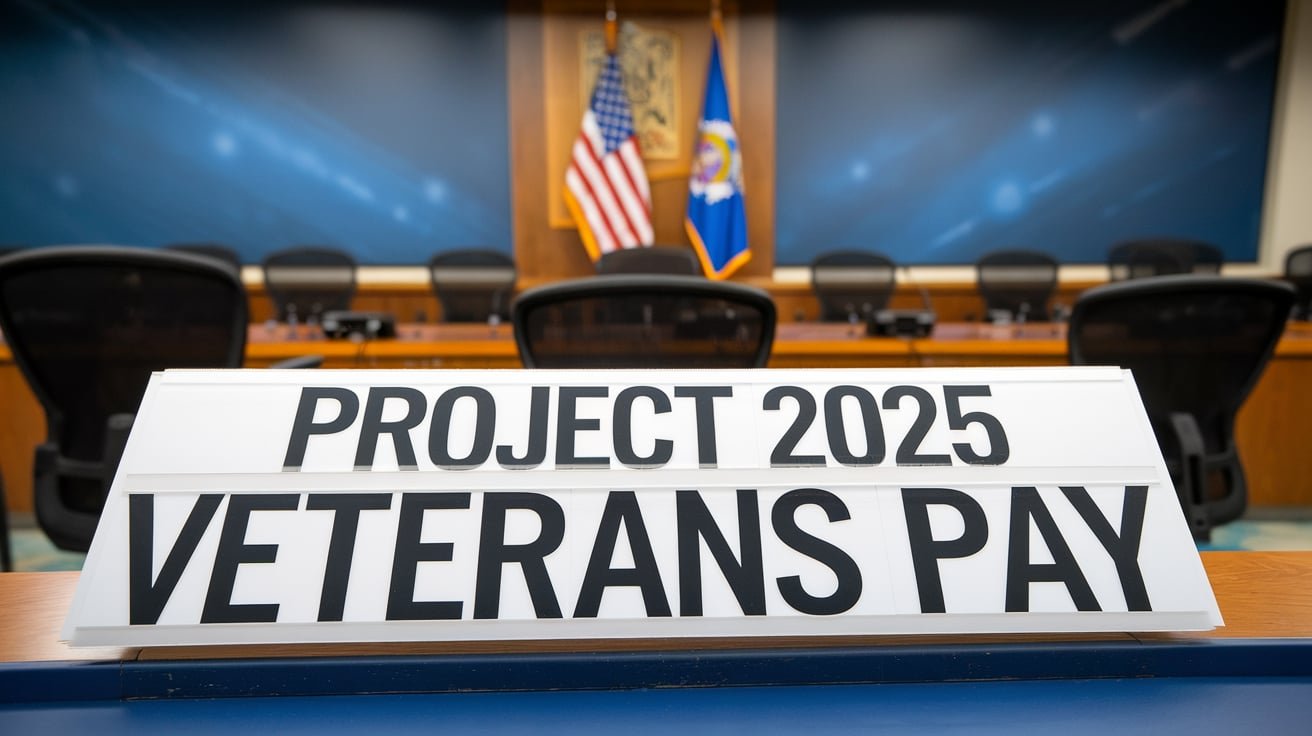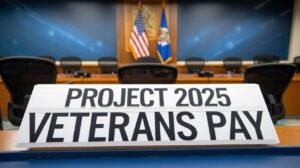Project 2025 Veterans Pay and Its Potential Impact
Introduction
The landscape of federal employment is undergoing significant scrutiny with the introduction of Project 2025. This proposal, which aims to slash the federal workforce by up to one million jobs, has raised alarms across various sectors, particularly regarding its impact on Project 2025 veterans pay. With veterans making up a substantial portion of the federal workforce, the implications for Project 2025 veterans pay and job security are profound.
What is Project 2025?
Project 2025 is a comprehensive initiative that seeks to reshape the federal government dramatically. Backed by prominent conservative think tanks, this proposal aligns with the policies of former President Trump, advocating for a leaner government. While supporters argue that reducing bureaucracy will enhance efficiency, many worry about the consequences for essential services and, notably, for veterans employed within these frameworks. The stakes are high when discussing Project 2025 veterans pay; cutting jobs in agencies employing veterans could have lasting impacts.
The Veteran Workforce
Veterans represent about 30% of the federal workforce, with approximately 300,000 veterans holding federal jobs. These individuals have served their country in military capacities and chosen to continue serving as civilians. They bring unique skills, dedication, and discipline to their roles—qualities that are often hard to find in the private sector. The impact of Project 2025 veterans pay is crucial; cutting jobs in agencies employing veterans could have lasting consequences.
Imagine this: a veteran transitioning from a military role to a civilian job at the FBI. They trade their combat boots for office shoes, but the mission remains the same—protect and serve. Now, with Project 2025 proposing cuts to agencies like the FBI and the Department of Justice, these veterans face an uncertain future regarding their veterans’ pay.
The Direct Impact on Veterans’ Pay
With Project 2025’s aggressive cuts, Project 2025 veterans pay is at risk. Many veterans rely on their federal jobs for financial stability. Cutting jobs in agencies that employ many veterans would reduce their income and diminish their sense of purpose. It’s like pulling the rug out from under someone who just finished a marathon—brutal and unnecessary.
Consider this: for a veteran who has dedicated years to public service, losing a job means losing more than a paycheck. It strips away their community, identity, and, frankly, a bit of their sanity. Project 2025 veterans pay is not merely a number; it represents their contribution to society and their ongoing commitment to the country.
Project 2025 and Its Objectives
The objectives of Project 2025 are clear: cut the federal workforce by 50% within a year and 75% within four years. Proponents believe this will create a more efficient government. But at what cost? The reality is that these drastic reductions will likely hinder the government’s ability to function effectively, leaving Project 2025 veterans pay and job security in jeopardy.
It’s a bit like trying to run a three-legged race without two of your legs—good luck with that!
The Broader Implications
The consequences of Project 2025 extend beyond just veterans. When you start dismantling agencies essential to national security and public welfare, you’re not just impacting a few people; you’re shaking the foundation of government operations. This could lead to longer wait times for veterans seeking benefits, reduced services, and a backlog in crucial areas.
If veterans were superheroes, the agencies they work for would be their Batcaves. Removing support from these agencies means our heroes are left without the tools to fight the good fight, ultimately affecting Project 2025 veterans pay.
The Emotional Toll
For many veterans, their job continues their military service—a mission that gives them purpose. Imagine a veteran who spent years in combat, only to come home and find themselves without a job because of hasty cuts. The emotional toll can significantly affect their mental health and overall well-being.
Studies show that employment is critical to a veteran’s transition to civilian life. If Project 2025 leads to massive layoffs, it’s likely to exacerbate issues like PTSD and depression among veterans, which is not just serious—it’s downright tragic. The emotional fallout could further complicate discussions about Project 2025 veterans pay.
The Political Landscape
Project 2025 isn’t just a policy proposal; it’s also a political statement. Many GOP leaders echo former President Trump’s sentiments, pushing for drastic cuts and a smaller government. But this raises an important question: Are we prioritizing political strategy over the well-being of those who have served?
While political motivations are understandable—who doesn’t love a good campaign slogan?—we must ask ourselves whether slashing jobs and benefits for veterans is the right approach. The irony is that those advocating for this plan often tout their support for veterans while simultaneously jeopardizing their livelihoods. Talk about mixed signals! And what about Project 2025 veterans pay? Where does that fit into the political game?
Alternatives to Drastic Cuts
Rather than resorting to extreme measures, we should explore alternatives prioritizing veterans’ well-being and job security. Options like retraining programs, better resource allocation, and improving existing services could achieve the goal of a more efficient government without sacrificing veterans’ livelihoods.
Imagine a world where veterans can transition smoothly into civilian roles, armed with new skills and opportunities, rather than facing the chopping block. This is not just wishful thinking—it’s achievable with the right policies, preserving both jobs and Project 2025 veterans pay.
Veterans Pay: A Shared Responsibility
Ultimately, the conversation surrounding Project 2025 veterans pay should involve everyone. It’s a shared responsibility between the government, society, and veterans. We owe it to our heroes to ensure they are compensated fairly for their service and contributions.
However, serious concerns arise when proposals like Project 2025 threaten to disrupt this balance. Are we ready to turn our backs on those who have given so much for our freedom?
The Humor in Irony
Let’s not forget the humor that can be found in irony. We’re discussing a plan to streamline government operations by making them less effective. It’s like trying to cut calories by skipping meals—a great plan if you want to starve!
Reducing bureaucracy sounds appealing, but the execution could lead to more chaos than efficiency. Sometimes, humor can shed light on serious issues, helping us see the absurdity of drastic cuts to vital services like Project 2025 veterans pay.
A Call to Action
As citizens, we must advocate for veterans and their pay and voice our concerns about Project 2025 and its implications. We can make our voices heard by contacting local representatives, engaging in community discussions, and raising awareness on social media.
Remember, our veterans deserve better than a political football game. They deserve respect, support, and a stable livelihood. If we don’t advocate for them, who else will?
The Economic Impact
It’s not just the Project 2025 veterans pay at stake; the broader economy could also suffer. With veterans making up a significant portion of the federal workforce, their loss could lead to decreased consumer spending and a dip in economic activity. When veterans lose jobs, they lose purchasing power, which can ripple through the economy like a stone thrown into a pond.
Consider how many businesses rely on veterans as customers. When those customers are out of work, it affects everyone—from the local coffee shop to the big-box retailers. A healthy economy relies on a healthy workforce, and veterans play a vital role in that equation, especially in the context of Project 2025 veterans pay.
The Future of Veterans Employment
Looking forward, we must ensure that veterans are not an afterthought in policy discussions. Any federal workforce reforms should prioritize their employment, and Project 2025 veterans pay. This is not just a matter of fairness; it’s a matter of practicality. A well-functioning government requires the expertise and dedication that veterans bring.
As we navigate the complexities of Project 2025, let’s focus on creating sustainable solutions that benefit all, especially those who have served.
Conclusion
In conclusion, Project 2025 presents a troubling proposal that could severely impact Project 2025 veterans pay and job security. The initiative’s aggressive cuts threaten not only the livelihoods of veterans but also the very functionality of our government. While the intentions behind such proposals may be rooted in the desire for efficiency, the reality is that they could create more harm than good.
We need to reflect on what we truly value as a society. Are we willing to sacrifice the well-being of our veterans for political expedience? The answer should be a resounding no. We must support those who have sacrificed so much for our freedom.
Let’s advocate for thoughtful solutions prioritizing Project 2025 veterans pay and job security over rash political maneuvers. Together, we can ensure our heroes are honored and supported, not left in the lurch by misguided proposals like Project 2025. After all, a nation that forgets its veterans risks losing its very soul.














Post Comment